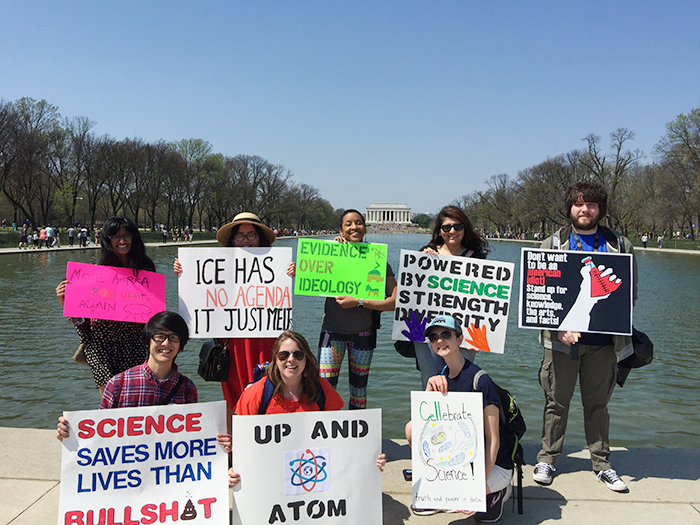Education Corner
From Structural Biology to Science Policy
By Leah Cairns, Johns Hopkins University School of Medicine
When I was an undergraduate I worked in two structural biology labs. One summer I attended a seminar on careers in science away from the bench. I learned about how scientists can use their training in really diverse fields like law, business, and policy. Even though I loved learning how to solve structures by NMR and X-ray crystallography, my eyes were opened to how I could transfer the skills I’ve learned in lab to a career away from the bench.
Since coming to graduate school I’ve continued my training as a structural biologist, but I’ve also found a passion for science policy. In the future, I hope to be able to use my training to be a translator and an advocate for scientists to ensure that we get the funding and support we need. To get started on this goal, I have been involved in policy work while still a student. A few years ago I joined the Johns Hopkins Science Policy Group (JHSPG), and am now the Advocacy Chair. It has been truly rewarding to help fellow scientists make their voices heard in local and federal government.
After the 2016 election, more and more scientists have recognized the importance of making our voices heard in the political sphere. Over one million people attended the 2017 March for Science in Washington DC and 600 other cities around the globe (1). The March was a great way to declare that we scientists are here, and we will have our voices heard. JHSPG helped arrange transportation to and from the event, and encouraged our peers to continue participating in policy after the March. There are a lot of ways scientists can continue to make their voices heard without even leaving your lab!

One of the easiest ways to make your voice heard is to contact your representatives. You can send letters or emails, or you can pick up the phone and make a call. Last year, students proved how effective this strategy can be. When an early draft of the tax bill was released, it contained a provision that would tax graduate students on their tuition waivers. Students and advocates rose to the occasion and flooded Congress’ phone lines. JHSPG hosted an event where students could come, eat breakfast, and make a phone call and write a postcard to Congress. The grad student tax was eventually removed from the final language of the bill (2), thanks in part to the advocacy work of students.

Postcards for Congress from the JHSPG-hosted event.
We usually call our representatives when we oppose measures they are considering. However, don’t forget to call and say thanks when they do something we support, like funding federal research. One way to encourage Congress to continue this upward trend is to call and say thanks for the budget increases we’ve seen this year. If you want to make your phone call more personal to your representative, check out FASEB’s website to find out how much federal funding your state or district receives each year.
If you find that you enjoy this kind of advocacy, you should consider joining or starting your own policy group on campus. Policy groups across the country have recently joined forces to create the National Science Policy Network, where groups can exchange ideas for best practices. Senior scientists should also consider joining the policy committee of their professional society. Many societies and coalitions even host advocacy days for students, post docs, and faculty to travel to Washington D.C. to meet with their representatives. This year, I participated in ASBMB’s Hill Day, and got to meet with representatives from across the country.

Poster presented by JHSPG member Chanel Matney at the 2018 ASBMB meeting.
Finally, scientists who want to get the full experience should consider applying for the AAAS Science and Technology Policy Fellowship. This yearlong fellowship places scientists in all three branches of the federal government. Many societies, including the Biophysical Society, sponsor fellows to serve as a congressional fellow through this program.
Whether you want to give it a whole year or even just a few minutes a month, making your voice heard through science policy and advocacy is a rewarding and worthwhile use of your time!
References
- https://medium.com/marchforscience-blog/the-science-behind-the-march-for-science-crowd-estimates-f337adf2d665
- https://www.vox.com/policy-and-politics/2017/12/15/16778862/republican-tax-bill-grad-student-tuition-benefits

Leah Cairns is a 5th year PhD Candidate at the Johns Hopkins University School of Medicine. She works in the Kavran Lab in the Bloomberg School of Public Health studying the molecular mechanisms of the Hippo signaling pathway (and the recently released PDB structure 6bn1). She is the Advocacy Chair for the Johns Hopkins Science Policy Group, and you can find her on Twitter at @lscairns18.